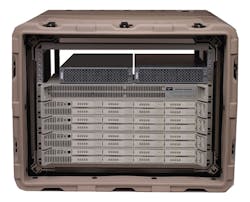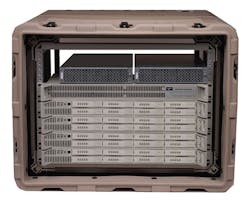Mercury to boost expertise in embedded servers and C4I with Themis acquisition
ANDOVER, Mass. - Executives of embedded computing specialist Mercury Systems in Andover, Mass., are boosting the company's expertise in rugged computer servers and in military command, control, communications, computers, and intelligence (C4I) with the acquisition of Themis Computer in Fremont, Calif.
Themis brings to Mercury new capabilities in hyperconverged computing for rugged mobile data servers.
Mercury has agreed to buy Themis for $180 million cash. Themis designs rugged computer servers and data storage systems based on commercial off-the-shelf components for military programs. Mercury focuses on secure sensor and safety-critical embedded processing subsystems, as well as on radio-frequency (RF) and microwave and electronic warfare (EW) systems for military applications.
Themis has a long history providing rugged embedded computing systems for U.S. Navy surface warships and submarines, and has concentrated on rugged hyperconverged computing architectures for mobile military data centers able to fit in the back of combat vehicles.
The combination of Themis's experience and installed base of rugged computer blade servers, and Mercury's expertise in secure trusted computing may be particularly attractive to the Navy, says Ian Dunn, vice president and general manager of Mercury's sensor and mission processing group. "Programs on our radar screen are about secure processing. When we look at the collective programs of the two companies, the Navy is a critical component of that."
Another potential benefit is the Themis expertise in small-form-factor (SFF) embedded computing and Mercury's know-how in RF and microwave and EW systems - particularly for unmanned aircraft. Themis was one of the first proponents of a SFF embedded computing industry standard called VITA 74 VNX, a VPX-like embedded computing standard designed to meet needs for extremely small size, weight, and power consumption in rugged mobile applications in military, transportation, and industrial automation.
"Themis does bring some interesting pieces, and one is small form factor," Dunn says. SFF capability could fit well with Mercury's airborne EW technologies. "It's about the capability to be small and lower power, and Themis brings more capabilities in the portfolio that could be useful in the EW community in the future."
For more information visit Mercury Systems at www.mrcy.com.

